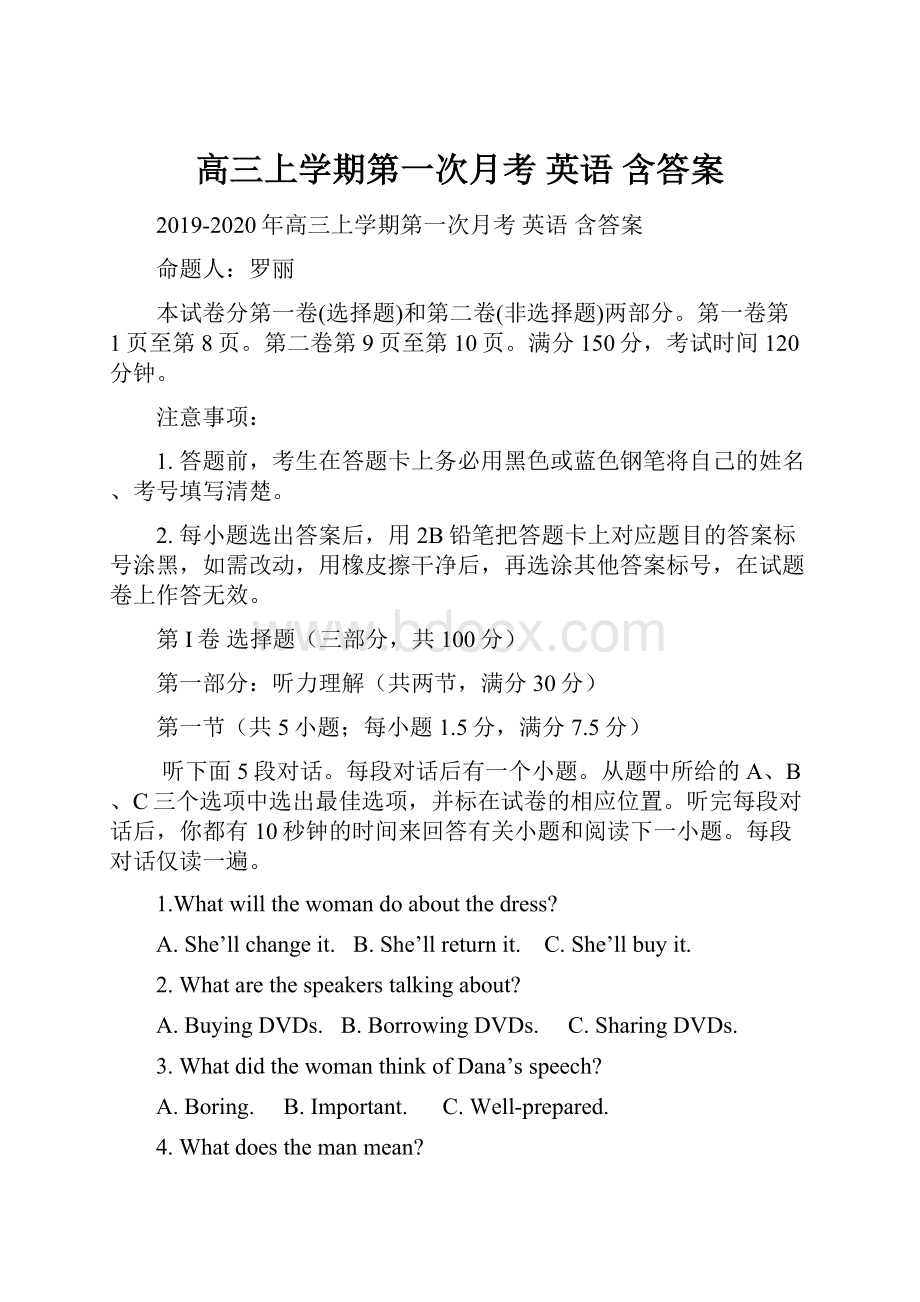高三上学期第一次月考 英语 含答案.docx
《高三上学期第一次月考 英语 含答案.docx》由会员分享,可在线阅读,更多相关《高三上学期第一次月考 英语 含答案.docx(16页珍藏版)》请在冰豆网上搜索。

高三上学期第一次月考英语含答案
2019-2020年高三上学期第一次月考英语含答案
命题人:
罗丽
本试卷分第一卷(选择题)和第二卷(非选择题)两部分。
第一卷第1页至第8页。
第二卷第9页至第10页。
满分150分,考试时间120分钟。
注意事项:
1.答题前,考生在答题卡上务必用黑色或蓝色钢笔将自己的姓名、考号填写清楚。
2.每小题选出答案后,用2B铅笔把答题卡上对应题目的答案标号涂黑,如需改动,用橡皮擦干净后,再选涂其他答案标号,在试题卷上作答无效。
第I卷选择题(三部分,共100分)
第一部分:
听力理解(共两节,满分30分)
第一节(共5小题;每小题1.5分,满分7.5分)
听下面5段对话。
每段对话后有一个小题。
从题中所给的A、B、C三个选项中选出最佳选项,并标在试卷的相应位置。
听完每段对话后,你都有10秒钟的时间来回答有关小题和阅读下一小题。
每段对话仅读一遍。
1.Whatwillthewomandoaboutthedress?
A.She’llchangeit.B.She’llreturnit.C.She’llbuyit.
2.Whatarethespeakerstalkingabout?
A.BuyingDVDs.B.BorrowingDVDs.C.SharingDVDs.
3.WhatdidthewomanthinkofDana’sspeech?
A.Boring.B.Important.C.Well-prepared.
4.Whatdoesthemanmean?
A.Heisunabletogivehelp.
B.Hewillcarrytheboxeslater.
C.Herefusestopayforboxes.
5.WhenisSimonsupposedtoarrive?
A.7:
30.B.8:
00.C.8:
10.
第二节(共15小题;每小题1.5分,满分22.5分)
听下面5段对话或独白,每段对话或独白后有几个小题,从题中所给的A、B、C三个选项中选出最佳选项,并标在试卷的相应位置。
听每段对话或独白前,你将有时间阅读各个小题,每小题5秒钟;听完后,各小题将给出5秒钟的做答时间。
每段对话或独白读两遍。
听第6段材料,回答第6至7题。
6.Wheredothespeakersplantogo?
A.Thewoman’shome.B.Amuseum.C.Alibrary.
7.WhydoesthewomanwanttogoonSaturdayafternoon?
A.Toenjoyniceweather.
B.Tosleeplateinthemorning.
C.Toavoidthecrowd.
听下面一段对话,回答第8至第10题。
8.Whydidthemanborrowthewoman’sputerlasttime?
A.Heneededitforhispaper.
B.Hisputerwasbroken.
C.Heuseditforhisputerclass.
9.Whydoesthewomanfeelhappy?
A.Themancanlendheraputernow.
B.Themanwillusehisownputer.
C.Themanwillstudybetter.
10.Whathasthemanbeendoingwithhisnewputer?
A.Doinghomework.B.Searchingforinformation.C.WatchingDVDs.
听下面一段对话,回答第11至第13题。
11.WheredidTomgettheideaofbeingabusinessman?
A.Fromthegrown-upsaroundhim.
B.Fromhishighschoolteachers.
C.Fromhiscollegefriends.
12.HowmuchdoesTomownofthepanyheworksfor?
A.60%.B.18%.C.6%.
13.WhatmistakedidTomandhispanymakeinthepast?
A.Makingalltheproductsthemselves.
B.Wastinglotsofmaterials.
C.Producingsimplethings.
听下面一段对话,回答第14至第17题。
14.Whatkindofjobsseemstobeinshortsupply?
A.Writers.B.Schoolteachers.C.Newspaperreporters.
15.WhereisSharonmostlikelytogo?
A.NewYork.B.Boston.C.California.
16.WhatdoesJamesplantodoifhecan’tfindajob?
A.Continuehiseducation.B.Startanewspaper.C.Writeabook.
17.Whoarethespeakers?
A.Fellowstudents.B.Laid-offworkers.C.Highschoolteachers.
听下面一段独白,回答第18至第20题。
18.Whydoestheuniversityofferthetwoprograms?
A.Tokeepstudentssafewalkinglateoralone.
B.Toprovidebetterhealthcareforstudents.
C.Tohelpvisitorstouraroundthecollege.
19.WhencanstudentscallCampusSafetyOffice?
A.From7p.m.to7a.m.
B.Anytimeoftheday.
C.Frommidnightto7a.m.
20.Towhomisthespeakermainlytalking?
A.Touristsatthecollege.B.Newteachers.C.Parentsofstudents.
第二部分:
阅读理解(共两节,满分40分)
第1节(共15小题;每小题2分,满分30分)
阅读下列短文,从每题所给的A、B、C和D项中,选出最佳选项,并在答题卡上将该项涂黑。
A
ToAmericanvisitors,Icelandisaveryinterestingcountry,partlybecauseitisdifferentinsomanywaysfromheorsheisusedtoseeingathome.Therearequiteafewthingsthatarenotdone,orthatdonotexistontheisland---quiteafew“No’s”.
Thereisnopollution,forinstance,NodogsarepermittedinReykjavik,thecapital.ThereisnotelevisiononThursdaysorduringtheentiremonthofJuly,andonlythreehoursofblack-and-whiteTVtherestofthetime.Thereisnohardliquor(烈酒)onWednesdaysandnobeeratanytime.Thereisnohandguns;onlyonejailofthirty-fivecells(狱室)intheentireland---anadmirablefigure,evenforasmallcountryof313,376people.
Thereisnoarmy,airforceornavy.Thereisnotippingforanything.TherearenolargestoresopenonSaturdaysorSundays.SinceIcelandissituatedjustundertheArcticCircle,thereisnodarknessinsummerandnodaylightinwinter.ButthankstoCulfStream,theclimateisrathermild,withtemperaturesrangingfrom34degreesto52degreesinJuly.
Therulesontelevisionliquorandgunsaretheresultofgovernmentdecisions.ButtheabsenceofpollutionisdueingreatparttothefactthatIcelandgetsitspowerfromtheenormousgeyserandthethousandsofhotspringsthateoutoftheground.Theyprovidealltheenergyneededbythecountry.Infact,Icelandusesonly3percentofallitsavailablepower.
Icelandhasbeendescribedasademocraticindependentcountrywheremorefisharecaughtandmorebookspublishedperpersonthananywhereelseintheworld.TheIcelandershavealwaysfeltaparticularloveforliterature.TheyposedtheirfirstbooksintheninthandtenthcenturiesAD.Theseworkswerepoemsandtalesaboutthekings,heroes,andheroinesofIcelandandNorway.Atfirst,thestorieswerememorizedandpassedfromgenerationtogeneration.Theywerefinallywrittendownbetween1140and1220.TheIcelandershaveneverstoppedwritingeversince.“Rathershoelessthanbookless,”theyproudlysay.
21.AmericanvisitorsenjoyvisitingIcelandprobablybecause_______.
A.nodogsarepermittedinthecapitalB.thepolicedonotcarryhandguns
C.theclimateisrathermildD.itisverydifferentfromAmerica
22.ThefollowingstatementsaretrueEXCEPT________.
A.therearenosoldiersinIcelandB.theIcelandersdon’tdrinkbeer
C.thereisnotipofanykindD.therearenocrimesinIceland
23.ThereisnopollutioninIcelandmainlybecause_______.
A.Icelandusesonly3percentofallitsavailablepower
B.theIcelandersusehotwaterfromthegroundbelowastheirenergy
C.itislocatedjustundertheArcticCircle
D.itisademocraticindependentcountry
24.“Rathershoelessthanbookless”means_______.
A.theyprefernottohaveshoeorbooks
B.theywouldratherhaveshoesonthanwritebooks
C.theyprefertravellingtoreading
D.theyregardbooksmoreimportantthanshoes.
B
LastJuly,my12-year-oldcardiedonCalifornia’sSantaAnaFreeway.Itwashourbeforesunset,andIwas25milesfromhome.Icouldn'treachanyonetopickmeup,soIdecidedtotakeabus.Notknowingtheroutes,IfiguredI’djustheadeast.Abuspulledup,andIaskedthedriverhowfarshewasgoing.“Fourmorelights,”shesaid.TherewasanotherbusIcouldtakefromthere.Thisclearlywasgoingtobealongnight.Shedroppedmeoffattheendofherrouteandtoldmewhichbustolookfor.Afterwaiting30minutes,Ibegantothinkaboutaveryexpensivetaxiridehome.Thenabuspulledup.Therewasnolightednumberaboveitswindshield.Itwasoutofservice.Butthedooropened,andIwassurprisedtofindthatitwasthesamedriver.“Ijustcan’tleaveyouhere,”shesaid.“Thisisn’tthenicestplace.Iwillgiveyouaridehome.”“Youwilldrivemehomeinthebus?
”Iasked,perplexed.“No,I’lltakeyouinmycar,”shesaid.“It’salongway,”Iprotested.“eon,”shesaid.“Ihavenothingelsetodo.”Aswedrovefromthestationinhercar,,shebegantellingmeastory.Afewdaysearlier,herbrotherhadrunoutofgas.AgoodSamaritan(乐善好施者)pickedhimup,tookhimtoaservicestationandthenbacktohiscar.“I’mjustpassingthefavoralong,”shesaid.WhenIofferedhermoneyasathankyou,shewouldn’thearofit.“Thatwouldn’tmakeitafavor,”shesaid.“Justdosomethingnicetosomebody.Passitalong.”
25.Whydidthewritersaythathewouldhavealongnight?
A.Hewonderedhowlonghehadtowaitforthenextbus.
B.Nodriverwouldgivehimaride.
C.Hedidn’tknowtheroutes.
D.Heperhapswouldhavetotakeataxi.
26.Whydidthewriterchangehismindafterwaitingfor30minutesattheendoftheroute?
A.Nobuswouldeatthetime.B.Ataxiridewouldbemorefortable.
C.Hebecameimpatientandabitworried.D.Heknewthedriverwouldneverreturn
27.Thebusdriverdrovethewriterhomelaterbecause________.
A.shehappenedtogointhesamedirection
B.shewantedtodosomethinggoodforotherpeople
C.herbrothertoldhertodoso
D.shewantedtoearnmoremoney
28.Thebusdriverhopedthatthewriter______.
A.woulddoasshedidB.wouldkeepherinmemory
C.wouldgivethemoneytoothersD.woulddoherafavor
C
PeoplefromEastAsiatendtohavemoredifficultythanthosefromEuropeindistinguishingfacialexpressions---andanewreportpublishedonlineinCurrentBiologyexplainswhy.
RachaelJack,UniversityofGlasgowresearcher,saidthatratherthanscanningevenlyacrossafaceasWesternersdo,Easternersfixtheirattentionontheeyes.
“WeshowthatEasternersandWesternerslookatdifferentfacefeaturestoreadfacialexpressions,”Jacksaid.“Westernerslookattheeyesandthemouthinequalmeasure,whileEasternersfavortheeyesandignorethemouth.”
AccordingtoJackandhercolleagues,thediscoveryshowsthathumanmunicationofemotionismoreplexthanpreviouslybelieved.Asaresult,facialexpressionsthathadbeenconsidereduniversallyrecognizablecannotbeusedreliablytoconveyemotionincross-culturalsituations.
Theresearchersstudiedculturaldifferencesintherecognitionoffacialexpressionsbyrecordingthefacialmovementsof13Westernpeopleand13Easternpeoplewhiletheyobservedpicturesofexpressivefacesandputthemintocategories:
happy,sad,surprised,fearful,disgusted,orangry.Theyparedhowaccuratelyparticipantsreadthosefacialexpressionsusingtheirparticulareyemovementstrategies.
ItturnedoutthatEasternersfocusedmuchgreaterattentionontheeyesandmadesignificantlymoreerrorsthanWesternersdid.“Theculturaldifference